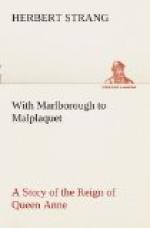While these things were going on in the Netherlands, another leader under the Grand Alliance, Prince Louis of Baden, took Landau, on the Rhine, from the French. In Italy, too, the allies triumphed, the gallant Prince Eugene, presently to be the warm and life-long friend of Marlborough, defeating the French brilliantly at Cremona, a fortunate thing for the Empire, which was thus secured from a French invasion through the Tyrol.
To crown the successes of the Grand Alliance during the campaign of 1702, the first of the war, the brave sailor Sir George Rooke, following the Spanish galleons and the French war vessels into the harbour of Vigo, destroyed the greater number of them. It was a repetition of Drake’s famous expedition to “singe the King of Spain’s beard.”
All these things happened while George Fairburn and other English prisoners ate their hearts out in captivity at Dunkirk. The lad chafed under the surveillance to which he was subjected, and never passed a day without turning over in his mind some scheme of escape. How it was to be done, he did not see. But he waited for his chance, and meanwhile, partly to avoid being suspected, and partly to while away the hours he made friends with the soldiers on guard. He already knew a little French, and with his natural quickness he soon made rapid progress. At the end of a month he could get along capitally in the language; at the end of three months he could speak the tongue fluently; at the end of nine months—for thus did his term of captivity drag itself out—he was, so far as the language was concerned, almost a Frenchman. Thus the winter passed, and the spring of 1703 came round, George Fairburn still an inmate of a French prison, hopeless of escape, so far as he could see.
But his chance came at last suddenly and unexpectedly. One morning he was escorted to the Hotel de Ville, to interpret for an officer examining a batch of English prisoners who had been brought in from the Netherlands border. The way to the town lay at no great distance from the shore, and he observed how a boat lay close in on the low sandy beach, no owner in sight. His heart leapt into his mouth, and he had much ado to keep himself from betraying his thoughts by the flush that mantled hotly on his cheek.
One, two, three hundred paces the boat was left behind. Now or never! Instantly the lad started off back to the spot, his feet flying across the sand.
A shout broke from the throats of his astonished guards, and a half score of bullets whistled after the runaway. George ducked his head and sped on unhurt. A second volley did little more harm than the first, merely grazing the lobe of his right ear. The race was furious, but the lusty English lad was far and away the superior of the heavy Frenchmen. He gained the boat, the enemy still a hundred paces behind. The painter was loosely wound round a large stone, and in a trice George had leapt with it into the little craft. He had just time to give a vigorous shove off before the pursuers came up, the foremost dashing into the sea after him.




